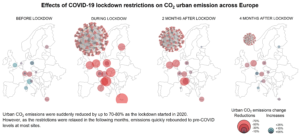A recent international study led by Integrated Carbon Observation System (ICOS) scientists highlights the importance of human behaviour in the efforts to cut down CO 2 emissions
HELSINKI, Finland, 24 May 2022: As COVID-19 first hit Europe in the spring of 2020, most countries laid out strong restrictions to limit the spread of the virus. Human economic activity and mobility in cities stopped almost instantly, and many people had to move their work from offices to homes.
A recently published study in Science of the Total Environment by Giacomo Nicolini et al shows that daily urban emissions were reduced by 5-87% during the lockdown period across 11 cities and 13 measurement sites, when compared to the same period in previous years.
According to the study, led by ICOS (Integrated Carbon Observation System), the largest reductions were seen in Heraklion in Greece; Pesaro and Florence in Italy; Berlin in Germany; Basel in Switzerland and London in the United Kingdom. In London, for example, emissions were reduced by 58%, in Berlin by 63% and in Florence by 66%, the authors of the study reported. In all cases, reductions happened mostly during daytime, except for Vienna, Amsterdam and London, where the restrictions had a clear effect also at night, they added.

Nicolini 2022 graph
“Looking at the diel cycle of CO2 fluxes, the reductions range on average from 67% in the city centre of Heraklion to about 10% in a residential area of Basel,” Dr Nicolini, the lead author of the paper, said. Dr Nicolini was also responsible for processing the data at the ICOS Ecosystem Thematic Center.
The study was initiated and led by other scientists from ICOS, which produces greenhouse gas data in Europe.
The main reason for the reduced CO 2 emissions in all cities was the reduction of vehicular traffic caused by the limitations on mobility, the authors said. This explains why residential areas saw the quickest rebound of emissions after the restrictions were lifted, they said.
In four cities – Berlin, Pesaro, Amsterdam and London – emissions remained statistically lower even after the restrictions were lifted, the authors said. In Amsterdam, the lower emissions can be explained by fewer tourists in the observed district, they said. Decreased tourism was likely to have affected Pesaro and London, as well, they pointed out.
To effectively mitigate climate change, the authors concluded, there must be a bigger systemic change in cities’ ecosystems and in people’s lifestyles. As the COVID-19 lockdown showed, changes in human behaviour have a direct, immediate and significant effect on urban CO 2 emissions, they said.
The research highlights the importance of measuring urban emissions. To develop best practices in this emerging field, ICOS said it has taken the task to evaluate different observation methods in its recent EU H2020 project, called ICOS Cities.
Professor Dario Papale, University of Tuscia, in Italy, and Director, ICOS Ecosystem Thematic Centre, said: “The ICOS Cities project will bring an extensive urban greenhouse gas exchange data collection for the global scientific community, available through the ICOS Carbon Portal. This data collection will be useful for additional analysis on the complex urban greenhouse gas exchange dynamic.”
Copyright © 2006-2025 - CPI Industry. All rights reserved.